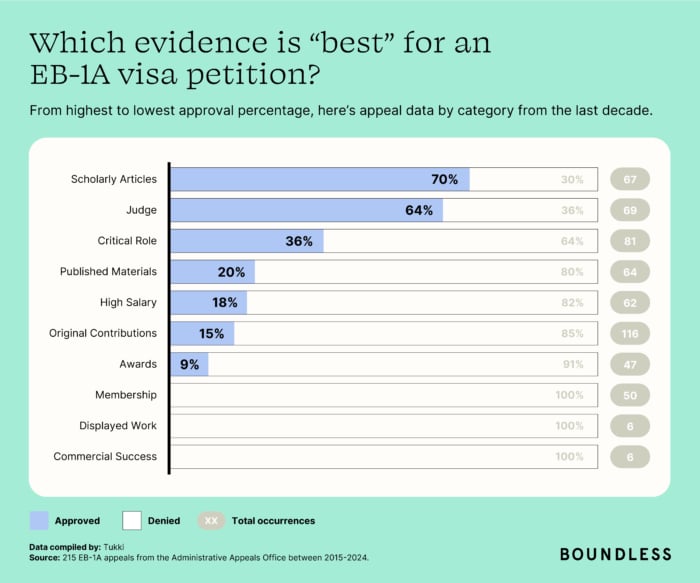In the world of high-skilled immigration, the EB-1A visa is a coveted option, offering a fast-track to U.S. permanent residency for individuals who can demonstrate extraordinary ability in their field. But what exactly makes an applicant stand out in the eyes of USCIS?
A recent review of appeal data — compiled from public records and industry sources, including Tukki — offers valuable insight into which types of evidence are most effective in securing EB-1A approval. The data spans over 200 cases from professionals in business, research, science, and technology, revealing clear trends in what USCIS tends to accept and what it tends to challenge.
For individuals preparing an EB-1A petition, this information provides a roadmap for strengthening their case. While every petition is unique, understanding how certain categories of evidence perform can make a meaningful difference in how a case is presented.

Categories That Strengthen an EB-1A Petition
- Published Scholarly Work – A Strong Foundation for Researchers
One of the clearest takeaways from the data is that scholarly work carries significant weight in EB-1A petitions. For researchers, academics, and technical professionals, having published articles in peer-reviewed journals is one of the strongest indicators of extraordinary ability. USCIS views this as direct proof of an individual’s contributions to their field.
Examples of Strong Documentation:
- Official invitations to review research articles or industry reports
- Letters confirming participation in award committees or judging panels
- Records of involvement in evaluating grants or academic programs
Best Practice: If your research has been cited frequently, including citation indexes or letters from experts discussing its impact can reinforce your case.
- Evaluating the Work of Others – Proof of Recognition in Your Field
Being selected to review or judge the work of peers is another strong indicator of professional distinction. Whether reviewing scientific papers, evaluating industry awards, or participating on selection panels, this type of role signals that your expertise is recognized beyond your own contributions.
Examples of Strong Documentation:
- Official invitations to review research articles or industry reports
- Letters confirming participation in award committees or judging panels
- Records of involvement in evaluating grants or academic programs
Best Practice: If you’ve served as a reviewer or judge but lack formal documentation, request a letter from the organization detailing your role and selection criteria.
- Holding a Critical Role – A Key Category for Executives and Entrepreneurs
For business leaders, demonstrating that you played an integral role in the success of an organization is one of the most compelling ways to prove extraordinary ability. However, USCIS requires clear evidence showing the measurable impact of your contributions.
Examples of Strong Documentation:
- Performance reports linking your work to company growth or major achievements
- Press coverage or industry recognition highlighting your leadership
- Internal documents showing your influence on key initiatives
Best Practice: Letters from executives, board members, or clients outlining the specific impact of your role can provide crucial supporting evidence.
Key Takeaways
The analysis of appeal data makes one thing clear: not all categories of evidence are weighed equally in an EB-1A petition. Published research, judging activities, and holding a critical role within an organization emerge as some of the strongest ways to demonstrate extraordinary ability. Meanwhile, categories like commercial success, displayed work, and professional memberships can still be useful but often require additional supporting documentation to be persuasive.
For anyone preparing an EB-1A petition, the key takeaway is that the strength of evidence matters more than just the number of categories met. Building a case around well-documented, high-impact contributions to your field will always be the best approach.